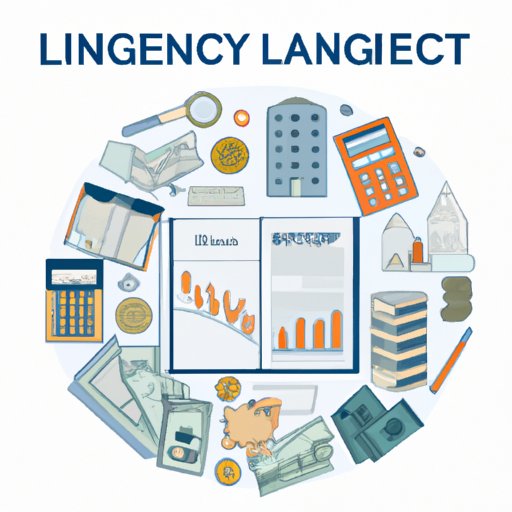Introduction
Financial literacy is the ability to understand and use various financial skills, such as budgeting, investing, and risk management. It is an important skill to have in order to make informed decisions about your money and achieve financial stability. Unfortunately, many people lack basic financial literacy, which can lead to serious problems like debt, bankruptcies, and poor credit scores. Luckily, there are many ways to gain financial literacy and take control of your finances.

Develop a Budget and Track Expenses
Creating a budget is one of the best ways to improve your financial literacy. A budget allows you to get an accurate picture of your income and expenses so you can make informed decisions about where to allocate your money. Additionally, it helps you identify areas where you may be overspending and make changes to reduce unnecessary expenses.
Creating a budget is relatively simple. First, you need to calculate your total monthly income. Then, list all of your necessary expenses, such as rent, utilities, food, and transportation. Finally, subtract your expenses from your income to determine how much money you have left over for other discretionary spending. Once your budget is created, it’s important to track your expenses on a regular basis to ensure that you’re staying within your budget.
Learn About Financial Products
In addition to budgeting, it’s important to learn about different financial products and investments. There are many types of financial products available, such as stocks, bonds, mutual funds, annuities, and Life Insurance. Each of these products has its own set of pros and cons, and it’s important to understand them before investing any money.
It’s also important to understand the concept of risk when it comes to investing. Risk is the likelihood that an investment will lose money. Generally, higher-risk investments have the potential to yield higher returns, but they also come with a greater chance of losing money. On the other hand, low-risk investments tend to offer lower returns, but they also come with less risk of loss.
Read Books and Articles on Personal Finance
Reading books and articles about personal finance is another great way to increase your financial literacy. There are many books and articles available that cover topics such as budgeting, investing, credit management, retirement planning, and more. Some recommended resources include The Total Money Makeover by Dave Ramsey and The Simple Path to Wealth by JL Collins.
When reading these materials, it’s important to remember that different authors may have different opinions about certain topics. It’s always best to do your own research and form your own opinions about what works best for you. Additionally, if you come across a term or concept that you don’t understand, don’t hesitate to look it up or ask someone who is knowledgeable about it.
Take Courses or Attend Seminars on Personal Finance
Taking a course or attending a seminar on personal finance is another great way to gain financial literacy. These courses or seminars typically cover topics such as budgeting, investing, taxes, insurance, and estate planning. Additionally, some courses or seminars may focus on specific topics, such as retirement planning or credit management.
Courses and seminars can be found at local community colleges, universities, and adult education centers. Additionally, many online courses and webinars are available. It’s important to find a course or seminar that is tailored to your needs and interests.

Utilize Online Tools to Manage Money
In today’s digital world, there are many online tools available to help you manage your money. Popular money management apps such as Mint, Acorns, and Clarity Money allow users to track their spending, create budgets, and set goals. Additionally, these apps often provide insights into your spending habits and suggest ways to save money.
Setting up an account on one of these apps is relatively straightforward. Simply download the app, create an account, and link your bank accounts. From there, you can begin tracking your spending, setting up budgets, and finding ways to save money.

Seek Advice from a Financial Planner or Advisor
Finally, it’s important to seek advice from a qualified financial planner or advisor. A financial planner or advisor can help you create a plan to reach your short- and long-term financial goals. Additionally, they can provide guidance on topics such as budgeting, investing, taxes, insurance, and estate planning. Working with a professional can help you feel more confident and secure in your financial decisions.
When looking for a financial planner or advisor, it’s important to make sure they are qualified. A good place to start is by checking out the National Association of Personal Financial Advisors (NAPFA). This organization requires its members to adhere to a strict code of ethics and provides a list of certified advisors.
Conclusion
Financial literacy is an important skill to have in order to make informed decisions about your money and achieve financial stability. Fortunately, there are many ways to gain financial literacy, such as creating a budget, learning about financial products, reading books and articles on personal finance, taking courses or attending seminars, utilizing online tools, and seeking advice from a financial planner or advisor. With a little bit of effort and dedication, anyone can become financially literate.
If you’re ready to take control of your finances, start by creating a budget and tracking your expenses. Then, learn about different financial products and read books and articles on personal finance. Consider taking a course or attending a seminar, and utilize online tools to manage your money. Finally, seek advice from a qualified financial planner or advisor. With these steps, you can start down the path to financial literacy.
Now is the time to take control of your finances and gain financial literacy. With the right knowledge and tools, you can achieve financial freedom and stability.
(Note: Is this article not meeting your expectations? Do you have knowledge or insights to share? Unlock new opportunities and expand your reach by joining our authors team. Click Registration to join us and share your expertise with our readers.)
